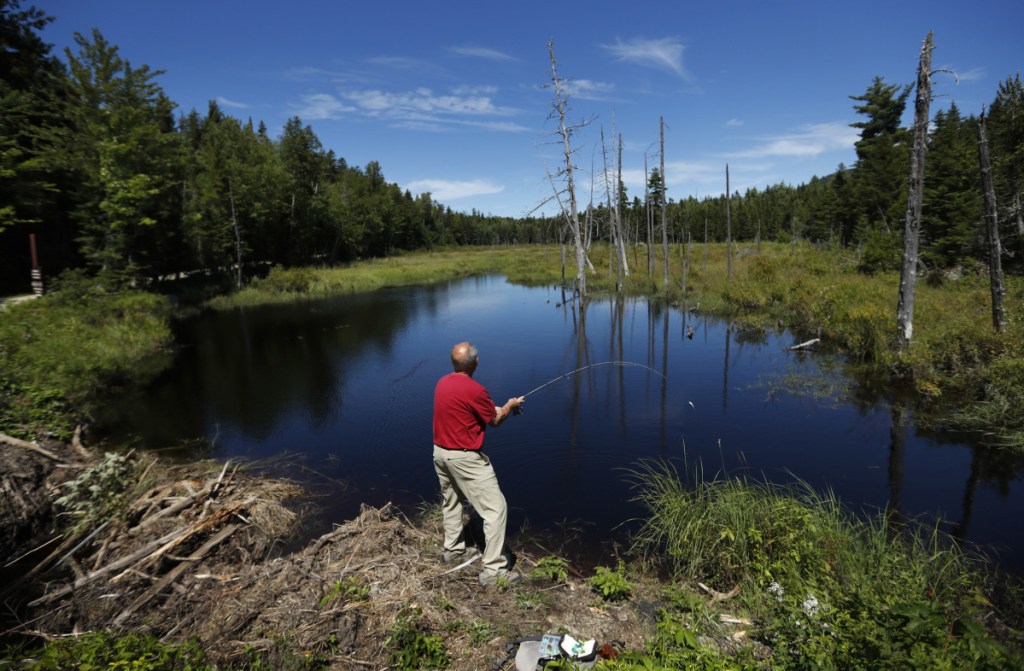As a fly-fishing guide based out of Kingfield, I get to share some of the most beautiful remote places in Maine with my clients from around the state and from as far away as Australia. After a 20-year guiding career, I’ve seen the raw excitement of a kid who has just hooked their first brookie and the calmer, but no less enthusiastic, energy of people who fish the same waters year after year and bring their grandkids along with them to share that tradition.
These experiences in these unique places are all part of Maine’s legacy of environmental stewardship and fishing. Central Maine Power’s proposal to build a 145-mile transmission line from Hydro-Quebec’s hydropower dams in Canada to Massachusetts would cut through undeveloped portions of Maine’s North Woods and would widen existing corridors for new power lines, too. It would unnecessarily threaten brook trout and their habitat, these special places, and these unique Maine experiences. These are all worth protecting, and Mainers should join me in speaking out against CMP’s transmission line.
Maine is the last stronghold in the nation for brook trout and has the largest remaining brook trout population in the country, so we have a lot to lose from CMP’s proposal.
Experts at Maine’s Department of Inland Fisheries & Wildlife say CMP’s project design doesn’t do enough to minimize and avoid harm to coldwater fisheries and other wildlife, including rare mayflies, bald eagles and whitetail deer.
CMP has been especially reluctant to provide adequate, forested buffers along the edges of streams that the transmission line would cross. As IF&W wrote in comments to CMP in March, adequate stream buffers are essential to keep waters cool, clean and healthy: They are a necessity for brook trout and other aquatic life.
Maine’s clean, cool streams are the heart of our unique brook trout resource, and CMP’s proposed line would cut right through some of the best brook trout habitat in Maine.
In addition to the direct harm that CMP’s proposal would do to brook trout, there are significant climate impacts that will also harm brook trout. Maine needs to push for energy that will actually help reduce climate pollution, and this project won’t do that. Climate change is a huge threat to brook trout, which need cool water to survive. Anglers who care about passing on the fishing tradition to future generations should worry about how climate change is harming brook trout.
This transmission corridor (basically an extension cord from Canada to Massachusetts) won’t help fight climate change. Hydro-Quebec is just going to take power that it was previously selling elsewhere and sell it to Massachusetts instead, via CMP’s line. Hydro-Quebec will not add any new renewable energy to their system to do so, nor do they have any excess power. They’ll just shift the sale of electricity from one place to another. This doesn’t create any new, clean sources of energy or reduce climate-changing pollution. In fact, CMP’s line might actually increase climate pollution. If Hydro-Quebec sells electricity to Massachusetts instead of the markets where they now sell this power, like New York or New Brunswick, Hydro-Quebec will have to purchase energy from different sources that may use gas, oil or coal. This would increase overall climate and air pollution in the Northeast, while sacrificing Maine’s North Woods and brook trout streams.
In early August, my nephew caught his very first brook trout on a Maine Heritage fish pond, in the heart of where this project is proposed. What I call “the last best place.” Having helped hundreds of people catch fish, I’ll never forget or tire of the look of awe and appreciation on someone’s face when they see that first wild brookie. My nephew’s reaction was no different from the businesswoman from Scotland, the plumber from Nebraska or the retired Marine from Augusta. Rarely in today’s world does one have the ability to hold in their hand the perfect natural jewel that is a wild brookie. The crown that holds all those jewels in place is the habitat that is threatened by CMP’s line.
If Mainers don’t unite to oppose this project, these unique places and special experiences will be a memory instead of an opportunity. The experts at IF&W have weighed in. Now it’s time for Maine citizens to submit comments and speak out about what we care about. I strongly oppose this transmission line, and I encourage all Mainers who care about our heritage and our future to oppose it as well.
Todd Towle is a Registered Maine Guide and owner and operator of Kingfisher River Guides in Kingfield.
Send questions/comments to the editors.



Success. Please wait for the page to reload. If the page does not reload within 5 seconds, please refresh the page.
Enter your email and password to access comments.
Hi, to comment on stories you must . This profile is in addition to your subscription and website login.
Already have a commenting profile? .
Invalid username/password.
Please check your email to confirm and complete your registration.
Only subscribers are eligible to post comments. Please subscribe or login first for digital access. Here’s why.
Use the form below to reset your password. When you've submitted your account email, we will send an email with a reset code.